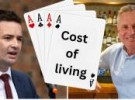Look for leadership if you're a swinging voter and unsure who you will vote for on March 23, or in any election.
$0/
(min cost $0)
Login or signup to continue reading
Of course there is a whole range of criteria begging for your assessment and vote, such as calibre of candidates, policies, the recent history of leaders and candidates and the collective behaviour of the government and opposition.
But nothing comes close to the judgement of leadership.
In modern day politics and presidential style elections the attributes of the leaders are paramount and your number one intuitive response, is their ability to lead.
Leadership.
And while in the Labor Party there is a more collegiate style and practice of party leadership, in the Liberal Party the success or failure at election time is based on the character of the leader.
The Libs tend to cloak their leaders in the garb of near biblical mystery and authority.
John Howard was like a school principal in the way he governed his party.
His leadership was unassailable, he was like the high priest, and his backbench and rank and file worshipped him.
The Libs historically love strong leaders, like a queen bee or king bee, where everything revolves around their decisions and desires.
Son of a service station owner Howard's pedigree was steeped in his humility and the way he could relate to his own kind, the Howard battlers.
During his reign, between 1996 and 2007, he was rarely challenged. His Treasurer Peter Costello dared not challenge.
The way Howard read the mood in 2004 and backed the forest industry against a strong temptation to go progressive and flirt with the Greens, was legendary.
I was in the Albert Hall when he mistakenly thought a rally of hard core, CFMEU forest workers were jeering him, but they were actually going wild cheering him like a sold-out Taylor Swift concert.
It wasn't simply because he backed their cause. It was more than that.
He was showing them leadership and these hardcore, left wing battlers voted Liberal.
The Tasmanian Labor Party threw everything at Robin Gray because he had stolen their constituency.
He was unashamed and doggedly pro-Hydro, whereas the Labor leadership in Doug Lowe and then Harry Holgate equivocated.
Big, burly West Coast workers and their families did not hesitate in swinging their allegiance to the growler, this embodiment of conservative rule, and his ability to understand their fears,
So what makes a leader.
If you Google the question you find words and phrases like enthusiasm, vision, resilience, decisiveness, loyalty, empathy.
Not so obvious are words like positivity, communication empowerment, motivation, focus and innovation.
In one of his last interviews before his death the great Labor Premier Eric Reece told me he always consulted widely about a policy, took it to Cabinet and the Caucus, and then stuck to the policy like glue and in the face of awesome protests.
My favourite Premier, Albert Ogilvie, (Madeleine's great uncle) governed Tasmania post-Great Depression in 1934 until his death at the outbreak of Word War II in 1939.
In these desperate years, when unemployment in Tasmania was 50 per cent - yes 50 per cent - he put able bodied men to work in manually building the 11.5 km of road to the Mount Wellington pinnacle.
No other premier would have confronted such odds so stacked against him, but he showed great leadership at this desperate hour.
It is easier for Liberal rank and file to realise their engagement with politics by focusing on the leader.
It is far more convenient and less challenging than spreading their hopes across a range of criteria.
They only need to watch the leader on television to make an intuitive assessment.
Pro-Labor battlers would approach it the same way, but the enlightened class, the trendy rank and file party members, unions, candidates and politicians favour the collegiate approach.
This is where Caucus elects the ministry and the leader allocates portfolios, while the complex array of factions compete for power and reforms.
In the Liberal Party it's winner take all.
That, if you're ruthless enough with a thick hide and you believe you're right and you love mixing with the battlers, then you might pass for a leader.
You're halfway there because the Liberals treat their leaders and the mystique of leadership, like Americans treat their president.
If I'm confusing you then watch the leaders after the election in the likelihood of a hung parliament.
Watch how they handle the numbers and how they broach the subject of minority government with the minor parties and independents, if the polls are right and the cross bench becomes the third force in the House of Assembly.
Jeremy Rockliff and Bec White are not my standouts as perfect models for parliamentary leadership, but their time may come in the days and weeks following the March 23 result.
For humble voters, this is their finest hour, when they decide for themselves who they think is best able to navigate through the maze of a hung parliament.





















 Toi Staff
Toi Staff Gideon Levy
Gideon Levy Belen Fernandez
Belen Fernandez Andrew Mitrovica
Andrew Mitrovica Mort Laitner
Mort Laitner Rami G Khouri
Rami G Khouri Ali Fathollah-Nejad
Ali Fathollah-Nejad Nikkei Editorial
Nikkei Editorial
